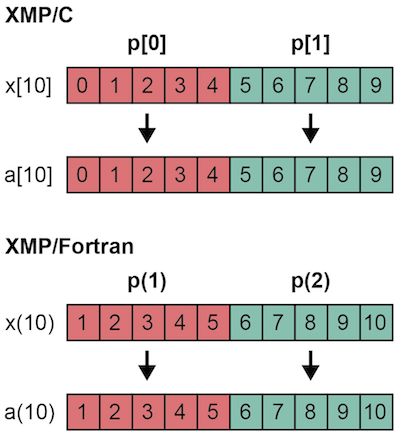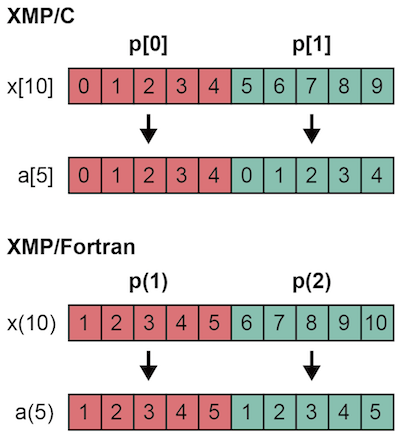23. プロシージャ・インタフェース¶
XMPにおけるプロシージャの呼び出しは,基本的にはベース言語と同じです. 異なる言語間のプロシージャや外部ライブラリの呼び出しも,ベース言語が対応していれば可能です.
下の例では,sub1()は分散配列を引数にしてsub2()を呼び出しています.
- XMP/Cプログラム
void sub1(){
#pragma xmp nodes p[2]
#pragma xmp template t[10]
#pragma xmp distribute t[block] onto p
double x[10];
#pragma xmp align x[i] with t[i]
sub2(x);
}
void sub2(double a[10]){
#pragma xmp nodes p[2]
#pragma xmp template t[10]
#pragma xmp distribute t[block] onto p
double a[10];
#pragma xmp align a[i] with t[i]
:
}
- XMP/Fortranプログラム
subroutine sub1()
!$xmp nodes p(2)
!$xmp template t(10)
!$xmp distribute t(block) onto p
real x(10)
!$xmp align x(i) with t(i)
call sub2(x)
end subroutine
subroutine sub2(a)
!$xmp nodes p(2)
!$xmp template t(10)
!$xmp distribute t(block) onto p
real a(10)
!$xmp align a(i) with t(i)
:
end subroutine
呼び出されるプロシージャ内で,引数にある分散配列を分散配列として用いたい場合は,その分散配列の形状をプロシージャ内で再定義する必要があります.

ただし,呼び出されるプロシージャ内で,引数にある分散配列を重複配列として用いたい場合は,再定義を行う必要はありません.
- XMP/Cプログラム
void sub1(){
#pragma xmp nodes p[2]
#pragma xmp template t[10]
#pragma xmp distribute t[block] onto p
double x[10];
#pragma xmp align x[i] with t[i]
sub2(x);
}
void sub2(double a[5]){
:
}
- XMP/Fortranプログラム
subroutine sub1()
!$xmp nodes p(2)
!$xmp template t(10)
!$xmp distribute t(block) onto p
real x(10)
!$xmp align x(i) with t(i)
call sub2(x)
end subroutine
subroutine sub2(a)
real a(5)
:
end subroutine
